mikeavelli
Moderator
- Messages
- 6,807
- Reactions
- 15,217
http://www.bbc.com/sport/formula1/34404641
A really good read for those that follow F1. I never really understand how they let Infiniti take credit for Renault's engineering and engines since all they did was pay for stickers on the car and try to pawn it off as they were really involved in F1.
Red Bull & Renault: How it started, where it went wrong, what now?
By Andrew Benson
Chief F1 writer
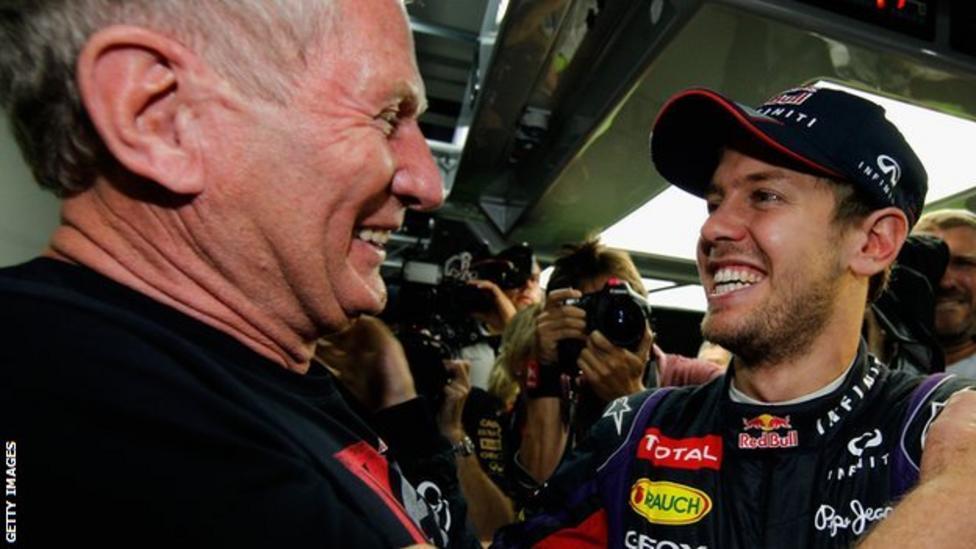
Sebastian Vettel, pictured with consultant Helmut Marko, drove Renault-powered Red Bulls to four successive world driver's titles from 2010-2013
From total domination to the brink of departure from the sport, Red Bull's rise and potential fall is a remarkable tale.
The road to the precarious position in which the team find themselves in Formula 1 dates back several years, to an engine supply partnership with Renault which hit problems almost as soon as it started.
That was the end of 2006 after Red Bull became dissatisfied with their previous supplier, Ferrari. Nine years on, Red Bull's options have distilled to another deal with Ferrari or quitting F1.
How they reached this point is a story of ambition, fuelled by success, turbocharged by frustration, spiced with a dash of arrogance and topped with a sense of entitlement. And not all of that applies to Red Bull.
It is a story of how the most successful team of the past five years have got to a point where, five races before the end of the 2015 season, they have secured a split from their current engine partner without having anything lined up to replace it.
On the face of it, it is a catastrophic strategic miscalculation. But, as ever in F1, it is not quite as simple as that.
The rise of Red Bull-Renault
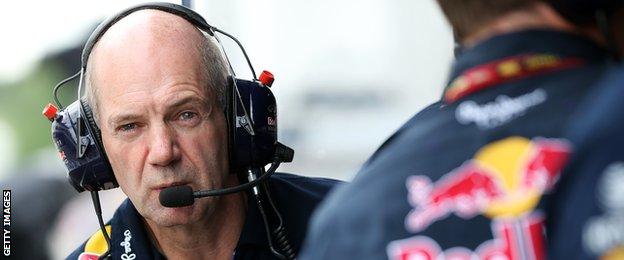
The partnership of Red Bull's Adrian Newey and Renault horsepower appeared invincible between 2010 and 2013
When Red Bull started their relationship with Renault in 2007, they soon realised that the engine was down on power compared with the rivals from Mercedes and Ferrari - which was a problem, because F1 had started a period of frozen engines, when only changes aimed at reliability would be allowed.
Red Bull and Renault started lobbying to be allowed to retune the engine, on the basis that the engine freeze was predicated on there being parity between teams, and there wasn't any.
Governing body the FIA agreed, and Renault was allowed to modify its engine over the winter of 2008, while Mercedes and Ferrari were not. Inevitably, this led to resentment that continues to rumble behind the scenes today.
Even after retuning, the Renault was not the most powerful engine - it lagged by about 5%, or 35bhp, according to Red Bull. But it had other positive attributes, including excellent driveability.
Rivals were not impressed when, following a major rule change on chassis for 2009, Red Bull-Renault had suddenly transformed themselves from midfielders to front-runners.
Read more from BBC F1
Renault sign Lotus buyout letter
Teams call in EU over 'unfair' F1
Red Bull face a messy divorce
Volkswagen close to buying Red Bull F1 team
For the latest F1 news, follow @bbcf1 on Twitter
Red Bull came on increasingly strong in that year's championship, but ended up as runners-up to Jenson Button and Brawn.
In 2010, Red Bull and Sebastian Vettel went one better - and then repeated the double success of drivers' and constructors' titles for the next three years.
A fair bit of that success over 2010-13 was based on Renault's expertise at a particularly esoteric form of engine technology.
The French company tuned the engine to blow exhaust gases even when the driver was off-throttle. These were harnessed by Red Bull's aerodynamicists, led by the genius Adrian Newey, to create rear downforce out of reach of other teams - even when they cottoned on to what Red Bull were up to.
Their lead driver adapted brilliantly to the unique and counter-intuitive driving style required by this technology and Vettel-Red Bull-Renault swept all before them.
The collapse of the relationship
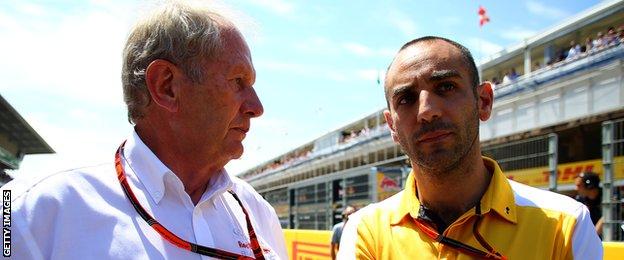
Red Bull consultant Dr Helmut Marko and Renault's Cyril Abiteboul at the 2015 Spanish Grand Prix
Behind the scenes, though, all was not well.
Red Bull bosses wasted no opportunity to point out that they were achieving this success despite having a down-on-power engine, rarely mentioning the effect of the blown exhaust. And Renault began to resent the lack of coverage they were getting for the success, despite their integral part in it.
Tensions began to grow.
Despite being a works partner, Red Bull were paying for their engines. Renault introduced to team principal Christian Horner the idea of a sponsorship from Infiniti, the luxury brand of Japanese company Nissan, which is part of an automotive conglomerate with Renault.
Horner and the Infiniti bosses quickly concluded a sponsorship deal for the 2011 season, which grew into a title sponsorship for 2013.
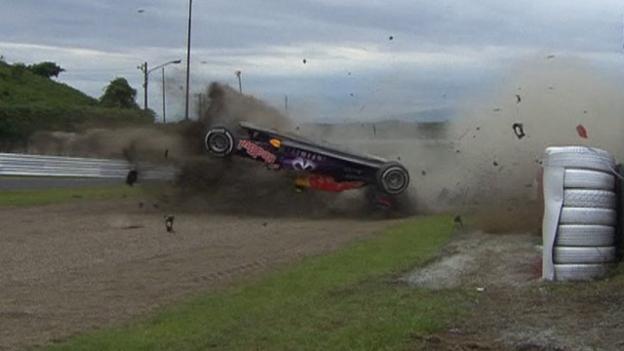
But the deal was not a win-win for Red Bull.
The Infiniti title sponsorship deal - worth $30m (£19.8m) - more than covered the cost of the engines. So it meant the Renault engines were effectively free. And even with the more expensive turbo hybrid engines introduced from 2014 Red Bull still had a net financial gain from the deal.
However, $30m was considerably less than the space allocated to Infiniti on the car could theoretically be sold for to another company.
So, all in all, Red Bull felt it was offering a pretty good arrangement to the Renault-Nissan group.
But the logic of the arrangement was always lost to those not involved - by putting another car company's brand on the Red Bull car, and including it in the team's official name, it was inevitably going to further frustrate Renault by reducing its brand exposure.
Sure enough, Renault realised this too. As Renault F1 boss Cyril Abiteboul puts it: "The problem is, when we were winning championships with Red Bull, no-one was talking about us."
Slow and unreliable: the hybrid disaster
Although both parties admit the relationship was not exactly one of roses and chocolates to begin with, things really began to go wrong from 2014.
Renault entered the new era of turbo hybrid engines last season with confidence. One executive told a senior insider in F1 towards the end of 2013: "Nobody knows more about turbocharged engines than Renault."
But the executive was wrong. Mercedes had committed more resources to the project much sooner than anybody else, and their four-year development programme resulted last year in an engine that was miles ahead of any other manufacturer.
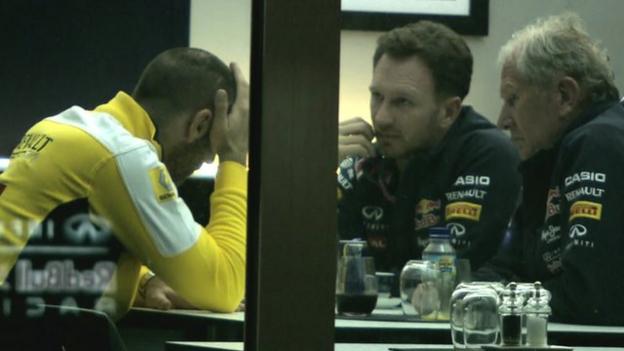
As well as being slow, Renault's engine was initially catastrophically unreliable, and Red Bull had a terrible pre-season testing programme.
The biggest problems were solved by the start of the season, but reliability remained an issue through 2014 and, with in-season development frozen, Red Bull were resigned to a season picking up scraps. They did, at least, win three races when things went wrong for Mercedes, thanks to some brilliant driving by Daniel Ricciardo.
Renault promised Red Bull a significant step forward in performance for 2015. But when the definitive 2015 engine appeared for the first time at the first race of the season in Australia, it was not only no more powerful than the 2014 engine, it had worse drivability and was unreliable.
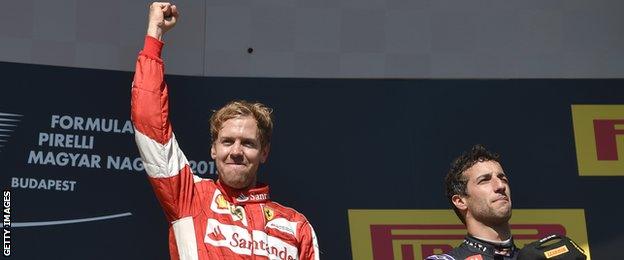
Former Red Bull driver Sebastian Vettel has enjoyed success with Ferrari since his move for 2015
Red Bull had had enough and severely criticised Renault in public after the race, Horner describing the situation as "unacceptable".
Renault, too, was unhappy, and both parties quickly concluded that the current relationship was not working for them.
The end game: finding new partners
Renault began to explore the possibility of running its own team again - five years after it had concluded this was not the way forward and handed its team to investment group Genii Capital.
Initially, Renault looked at Toro Rosso, Red Bull's junior team. Red Bull proposed a deal that locked it into the Renault Group - Renault would buy and rebrand Toro Rosso; Red Bull would continue with Renault engines, but badged as Infiniti. Renault rejected it and started to look at buying back its old team, now called Lotus.
Meanwhile, Red Bull had funded its own engine development programme with the British Ilmor company.
By early summer, it had produced a new engine design that it believed would be 0.45secs a lap quicker than the current one.
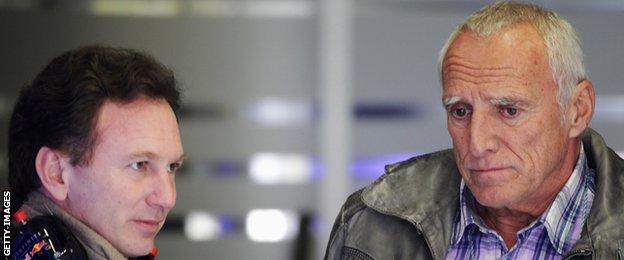
Red Bull team principal Christian Horner (left) and company owner Dietrich Mateschitz
Renault was doing its own parallel development. After being told about Ilmor's progress, Renault said its development engine was worth an extra 0.46secs, and it would pursue that design.
Later, that step forward was downgraded to 0.25secs. Now, Renault is telling Red Bull the new engine that is due to debut at the US Grand Prix next month will gain them 0.15secs. Red Bull is questioning whether that gain is worth the grid penalties using it would incur.
As this saga unfolded, Red Bull owner Dietrich Mateschitz decided he had had enough of Renault - and that he would not work with them any longer, even if it meant pulling out of F1.
That the Red Bull-Renault partnership will end after this season has not been officially announced, but it is an open secret within F1.
The Mercedes option: Wolff shuts down deal
As the Renault relationship collapsed, Red Bull began exploring other options. First on the list was Mercedes.
Mateschitz - who has a longstanding antipathy towards Mercedes for a reason few in F1 understand - met with Mercedes non-executive chairman Niki Lauda, a fellow Austrian, who is close to Red Bull motorsport adviser Helmut Marko.
There are differing versions of what happened at that meeting. One is that a deal for Red Bull to have Mercedes engines in 2016 was "effectively agreed". Except Lauda is not empowered to make that decision.
Another is that Lauda said he was pro the idea and would do all he could to persuade Mercedes to make it happen.
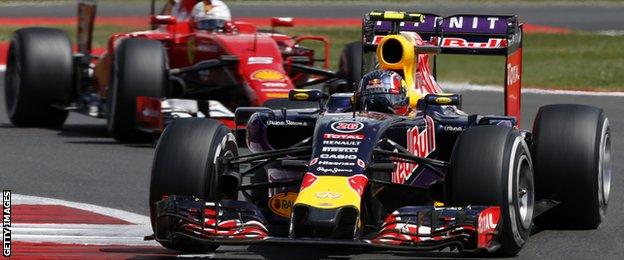
Could Ferrari power once again sit behind a Red Bull driver?
Red Bull's problem was that Mercedes F1 boss Toto Wolff was very much against the idea - and he worked hard to make sure it did not happen. By early September, Wolff had got his way.
Now, though, Red Bull had a problem. They had dumped Renault and Mercedes had said no. Which only left Ferrari, whose engine in 2015 has improved dramatically and is as near as makes no real difference a match for Mercedes.
No problem - Ferrari president Sergio Marchionne had said as long ago as June that he would be happy to supply Red Bull engines if they needed them.
But what he did not say was which engines - and there's the rub.
Ferrari's F1 team have offered Red Bull a supply of 2015 engines - their very real fear being that if Red Bull had parity, they would beat Ferrari, whose car has not been as good as a Red Bull since 2009.
Red Bull describe this as an "insult", given that Ferrari customers Sauber and Haas will get 2016 engines, and say if they do not get parity they will quit F1. And so they have reached an impasse.
Red Bull and Ferrari both have cards to play
Red Bull have a negotiating position. Ferrari wants to change the engine development rules for next year, to give it a chance of surpassing Mercedes.
Currently, in-season engine development is banned again next year, after being permitted on a limited basis this season. Ferrari want the system that has applied this year to continue - and Honda and Renault want completely open development, to try to close the chasm that exists between them and the others. Mercedes are open to discussion.
But for this to be allowed, all the teams need to agree - and Red Bull could threaten to block it unless they are given a 2016 Ferrari engine.
Ferrari, though, also have cards in their hands.
Red Bull have under contract four of the most promising young drivers in F1. Ferrari initially had Ricciardo at the top of their list as a potential replacement for Kimi Raikkonen in 2016, but he is locked into Red Bull until the end of 2018.
The Italian team are also interested in Toro Rosso's teenage sensation Max Verstappen, who has a three-year deal with Red Bull until the end of 2017.
Ferrari could use their interest in either of them as leverage in the engine negotiations.
It's a game of brinksmanship. Who will win? The Austrian soft drinks billionaire? Or the world's most glamorous car brand?
A really good read for those that follow F1. I never really understand how they let Infiniti take credit for Renault's engineering and engines since all they did was pay for stickers on the car and try to pawn it off as they were really involved in F1.
Red Bull & Renault: How it started, where it went wrong, what now?
By Andrew Benson
Chief F1 writer
- From the sectionFormula 1

Sebastian Vettel, pictured with consultant Helmut Marko, drove Renault-powered Red Bulls to four successive world driver's titles from 2010-2013
From total domination to the brink of departure from the sport, Red Bull's rise and potential fall is a remarkable tale.
The road to the precarious position in which the team find themselves in Formula 1 dates back several years, to an engine supply partnership with Renault which hit problems almost as soon as it started.
That was the end of 2006 after Red Bull became dissatisfied with their previous supplier, Ferrari. Nine years on, Red Bull's options have distilled to another deal with Ferrari or quitting F1.
How they reached this point is a story of ambition, fuelled by success, turbocharged by frustration, spiced with a dash of arrogance and topped with a sense of entitlement. And not all of that applies to Red Bull.
It is a story of how the most successful team of the past five years have got to a point where, five races before the end of the 2015 season, they have secured a split from their current engine partner without having anything lined up to replace it.
On the face of it, it is a catastrophic strategic miscalculation. But, as ever in F1, it is not quite as simple as that.
The rise of Red Bull-Renault

The partnership of Red Bull's Adrian Newey and Renault horsepower appeared invincible between 2010 and 2013
When Red Bull started their relationship with Renault in 2007, they soon realised that the engine was down on power compared with the rivals from Mercedes and Ferrari - which was a problem, because F1 had started a period of frozen engines, when only changes aimed at reliability would be allowed.
Red Bull and Renault started lobbying to be allowed to retune the engine, on the basis that the engine freeze was predicated on there being parity between teams, and there wasn't any.
Governing body the FIA agreed, and Renault was allowed to modify its engine over the winter of 2008, while Mercedes and Ferrari were not. Inevitably, this led to resentment that continues to rumble behind the scenes today.
Even after retuning, the Renault was not the most powerful engine - it lagged by about 5%, or 35bhp, according to Red Bull. But it had other positive attributes, including excellent driveability.
Rivals were not impressed when, following a major rule change on chassis for 2009, Red Bull-Renault had suddenly transformed themselves from midfielders to front-runners.
Read more from BBC F1
Renault sign Lotus buyout letter
Teams call in EU over 'unfair' F1
Red Bull face a messy divorce
Volkswagen close to buying Red Bull F1 team
For the latest F1 news, follow @bbcf1 on Twitter
Red Bull came on increasingly strong in that year's championship, but ended up as runners-up to Jenson Button and Brawn.
In 2010, Red Bull and Sebastian Vettel went one better - and then repeated the double success of drivers' and constructors' titles for the next three years.
A fair bit of that success over 2010-13 was based on Renault's expertise at a particularly esoteric form of engine technology.
The French company tuned the engine to blow exhaust gases even when the driver was off-throttle. These were harnessed by Red Bull's aerodynamicists, led by the genius Adrian Newey, to create rear downforce out of reach of other teams - even when they cottoned on to what Red Bull were up to.
Their lead driver adapted brilliantly to the unique and counter-intuitive driving style required by this technology and Vettel-Red Bull-Renault swept all before them.
The collapse of the relationship

Red Bull consultant Dr Helmut Marko and Renault's Cyril Abiteboul at the 2015 Spanish Grand Prix
Behind the scenes, though, all was not well.
Red Bull bosses wasted no opportunity to point out that they were achieving this success despite having a down-on-power engine, rarely mentioning the effect of the blown exhaust. And Renault began to resent the lack of coverage they were getting for the success, despite their integral part in it.
Tensions began to grow.
Despite being a works partner, Red Bull were paying for their engines. Renault introduced to team principal Christian Horner the idea of a sponsorship from Infiniti, the luxury brand of Japanese company Nissan, which is part of an automotive conglomerate with Renault.
Horner and the Infiniti bosses quickly concluded a sponsorship deal for the 2011 season, which grew into a title sponsorship for 2013.

But the deal was not a win-win for Red Bull.
The Infiniti title sponsorship deal - worth $30m (£19.8m) - more than covered the cost of the engines. So it meant the Renault engines were effectively free. And even with the more expensive turbo hybrid engines introduced from 2014 Red Bull still had a net financial gain from the deal.
However, $30m was considerably less than the space allocated to Infiniti on the car could theoretically be sold for to another company.
So, all in all, Red Bull felt it was offering a pretty good arrangement to the Renault-Nissan group.
But the logic of the arrangement was always lost to those not involved - by putting another car company's brand on the Red Bull car, and including it in the team's official name, it was inevitably going to further frustrate Renault by reducing its brand exposure.
Sure enough, Renault realised this too. As Renault F1 boss Cyril Abiteboul puts it: "The problem is, when we were winning championships with Red Bull, no-one was talking about us."
Slow and unreliable: the hybrid disaster
Although both parties admit the relationship was not exactly one of roses and chocolates to begin with, things really began to go wrong from 2014.
Renault entered the new era of turbo hybrid engines last season with confidence. One executive told a senior insider in F1 towards the end of 2013: "Nobody knows more about turbocharged engines than Renault."
But the executive was wrong. Mercedes had committed more resources to the project much sooner than anybody else, and their four-year development programme resulted last year in an engine that was miles ahead of any other manufacturer.

As well as being slow, Renault's engine was initially catastrophically unreliable, and Red Bull had a terrible pre-season testing programme.
The biggest problems were solved by the start of the season, but reliability remained an issue through 2014 and, with in-season development frozen, Red Bull were resigned to a season picking up scraps. They did, at least, win three races when things went wrong for Mercedes, thanks to some brilliant driving by Daniel Ricciardo.
Renault promised Red Bull a significant step forward in performance for 2015. But when the definitive 2015 engine appeared for the first time at the first race of the season in Australia, it was not only no more powerful than the 2014 engine, it had worse drivability and was unreliable.

Former Red Bull driver Sebastian Vettel has enjoyed success with Ferrari since his move for 2015
Red Bull had had enough and severely criticised Renault in public after the race, Horner describing the situation as "unacceptable".
Renault, too, was unhappy, and both parties quickly concluded that the current relationship was not working for them.
The end game: finding new partners
Renault began to explore the possibility of running its own team again - five years after it had concluded this was not the way forward and handed its team to investment group Genii Capital.
Initially, Renault looked at Toro Rosso, Red Bull's junior team. Red Bull proposed a deal that locked it into the Renault Group - Renault would buy and rebrand Toro Rosso; Red Bull would continue with Renault engines, but badged as Infiniti. Renault rejected it and started to look at buying back its old team, now called Lotus.
Meanwhile, Red Bull had funded its own engine development programme with the British Ilmor company.
By early summer, it had produced a new engine design that it believed would be 0.45secs a lap quicker than the current one.

Red Bull team principal Christian Horner (left) and company owner Dietrich Mateschitz
Renault was doing its own parallel development. After being told about Ilmor's progress, Renault said its development engine was worth an extra 0.46secs, and it would pursue that design.
Later, that step forward was downgraded to 0.25secs. Now, Renault is telling Red Bull the new engine that is due to debut at the US Grand Prix next month will gain them 0.15secs. Red Bull is questioning whether that gain is worth the grid penalties using it would incur.
As this saga unfolded, Red Bull owner Dietrich Mateschitz decided he had had enough of Renault - and that he would not work with them any longer, even if it meant pulling out of F1.
That the Red Bull-Renault partnership will end after this season has not been officially announced, but it is an open secret within F1.
The Mercedes option: Wolff shuts down deal
As the Renault relationship collapsed, Red Bull began exploring other options. First on the list was Mercedes.
Mateschitz - who has a longstanding antipathy towards Mercedes for a reason few in F1 understand - met with Mercedes non-executive chairman Niki Lauda, a fellow Austrian, who is close to Red Bull motorsport adviser Helmut Marko.
There are differing versions of what happened at that meeting. One is that a deal for Red Bull to have Mercedes engines in 2016 was "effectively agreed". Except Lauda is not empowered to make that decision.
Another is that Lauda said he was pro the idea and would do all he could to persuade Mercedes to make it happen.

Could Ferrari power once again sit behind a Red Bull driver?
Red Bull's problem was that Mercedes F1 boss Toto Wolff was very much against the idea - and he worked hard to make sure it did not happen. By early September, Wolff had got his way.
Now, though, Red Bull had a problem. They had dumped Renault and Mercedes had said no. Which only left Ferrari, whose engine in 2015 has improved dramatically and is as near as makes no real difference a match for Mercedes.
No problem - Ferrari president Sergio Marchionne had said as long ago as June that he would be happy to supply Red Bull engines if they needed them.
But what he did not say was which engines - and there's the rub.
Ferrari's F1 team have offered Red Bull a supply of 2015 engines - their very real fear being that if Red Bull had parity, they would beat Ferrari, whose car has not been as good as a Red Bull since 2009.
Red Bull describe this as an "insult", given that Ferrari customers Sauber and Haas will get 2016 engines, and say if they do not get parity they will quit F1. And so they have reached an impasse.
Red Bull and Ferrari both have cards to play
Red Bull have a negotiating position. Ferrari wants to change the engine development rules for next year, to give it a chance of surpassing Mercedes.
Currently, in-season engine development is banned again next year, after being permitted on a limited basis this season. Ferrari want the system that has applied this year to continue - and Honda and Renault want completely open development, to try to close the chasm that exists between them and the others. Mercedes are open to discussion.
But for this to be allowed, all the teams need to agree - and Red Bull could threaten to block it unless they are given a 2016 Ferrari engine.
Ferrari, though, also have cards in their hands.
Red Bull have under contract four of the most promising young drivers in F1. Ferrari initially had Ricciardo at the top of their list as a potential replacement for Kimi Raikkonen in 2016, but he is locked into Red Bull until the end of 2018.
The Italian team are also interested in Toro Rosso's teenage sensation Max Verstappen, who has a three-year deal with Red Bull until the end of 2017.
Ferrari could use their interest in either of them as leverage in the engine negotiations.
It's a game of brinksmanship. Who will win? The Austrian soft drinks billionaire? Or the world's most glamorous car brand?
